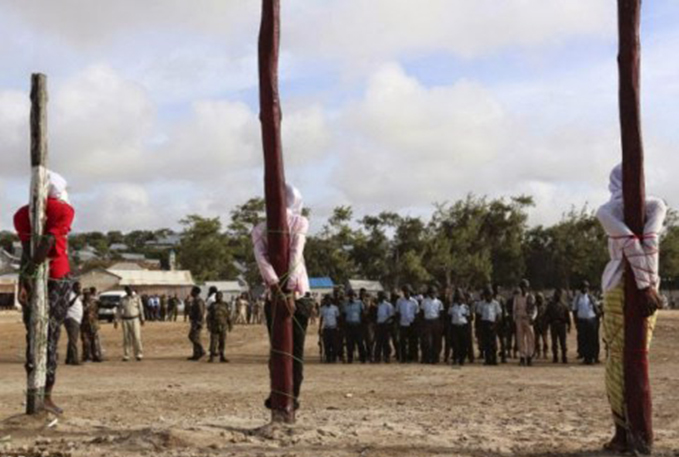
Report from SBS
Indonesia’s attorney-general has the funds and the will to wield the death penalty again, even though last year’s record 14 executions failed to dent drug crimes as promised.
On January 18 last year, six drugs prisoners were sent to firing squads; all but one of them was a foreigner.
There would be more international condemnation when another eight people were executed in April, including Australians Andrew Chan and Myuran Sukumaran.
Despite the diplomatic blowback, Indonesia is yet to retreat from the death penalty.
No plans are in place and officially, Jakarta says its focus is on improving economic conditions.
But the attorney-general’s office has the budget to execute 14 prisoners in 2016.
HM Prasetyo on Wednesday told lawmakers there was no connection between executions and the economy.
‘Shock therapy’
According to reports, he admitted drug crime was still rising, and that was reason to push ahead with the “shock therapy” approach.
“I’m confident that the death penalty is a kind of therapy,” he was quoted by The Jakarta Post as saying. “It is an unpleasant action, but we must do it.”
Haris Azhar of rights group KontraS says it’s clear there has been no deterrent effect.
President Joko Widodo, he says, is saddled with a failed policy that remains popular with constituents.
“In 2015 we saw a period where the new government was laying down its authority,” he said.
“This year, and into the future, there’s no guarantee that when the government’s popularity is down again, it wouldn’t be used for grabbing public support.”
Migrant Care’s Anis Hidayah says Indonesia will need a long road map towards abolishing the death penalty, with a moratorium as the first step.
‘Moral legitimacy’
The organisation that assists Indonesian workers in trouble abroad argues Indonesia lacks “moral legitimacy” to save their lives when it practises the same policy.
“Our demand is the same, whether it’s to Saudi Arabia or to our own government,” she said.
News of Jakarta’s preparations have horrified prisoners on death row, who include Mary Jane Veloso.
The Filipino single mum was prepared for the firing squad alongside Sukumaran and Chan, but was given a last-minute reprieve pending the trial of the couple accused of setting her up as an unwitting drug mule.
Veloso’s family last week visited her in prison for the first time since that emotional night.
Lawyer Edre Olalia trusts the Indonesian authorities will wait for the legal process, saying, “an honourable government will fulfil an honourable commitment”.
Misfortune, corruption
While publicity around Veloso’s case may yet save her from the death penalty, the misfortune and corruption that lands others on death row never comes to light.
The Institute for Criminal Justice Reform (ICJR) raises the case of Zainal Abidin, an Indonesian executed with Sukumaran and Chan.
His chance for appeal vanished – literally – when the paperwork went missing for 10 years.
The ICJR points out also that groups are still challenging the president’s ability to reject clemency without actually reviewing the individual’s case.
None of this seems to impress those who still see capital punishment as the solution to a “drugs emergency”.
National Narcotics Board (BNN) spokesman Slamet Pribadi says in his opinion, the next 14 prisoners should be executed “as soon as possible”.
Rights of victims
He says 33 Indonesians die every day as a result of illicit drugs – a revision of the 40-50 figure used by the president to justify the policy.
“Human rights, this is for those Western people to know, for those who are against death penalty, human rights does not only apply to the criminal perpetrators,” he said.
“What about the human rights of victims?”










































